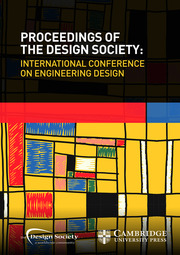Article contents
Exploring the Application of Network Analytics in Characterizing a Conceptual Design Space
Published online by Cambridge University Press: 26 July 2019
Abstract
The ability to effectively analyse design concepts is essential for making early stage design decisions. Human evaluations, the most common assessment method, describe individual design concepts on a variety of ideation metrics. However, this approach falls short in creating a holistic representation of the design space as a whole that informs the underlying relations between concepts. Motivated by this shortcoming, this work leverages network theory to visualize and characterize features of a conceptual design space. To illustrate the utility of network theory for these purposes, a network composed of a corpus of solutions to a design problem and their semantic similarity is derived, and its design properties (e.g., uniqueness and innovation potential) are studied. This network-based approach not only characterizes features of individual designs themselves, but also uncovers more nuanced properties of the design space through studying emerging clusters of concepts. Overall, this work expands on developing research in design, demonstrating the value in applying network analytics to a conceptual design space as an engineering support tool to aid design decision-making.
- Type
- Article
- Information
- Proceedings of the Design Society: International Conference on Engineering Design , Volume 1 , Issue 1 , July 2019 , pp. 1953 - 1962
- Creative Commons
- This is an Open Access article, distributed under the terms of the Creative Commons Attribution-NonCommercial-NoDerivatives licence (http://creativecommons.org/licenses/by-nc-nd/4.0/), which permits non-commercial re-use, distribution, and reproduction in any medium, provided the original work is unaltered and is properly cited. The written permission of Cambridge University Press must be obtained for commercial re-use or in order to create a derivative work.
- Copyright
- © The Author(s) 2019
References
- 4
- Cited by


